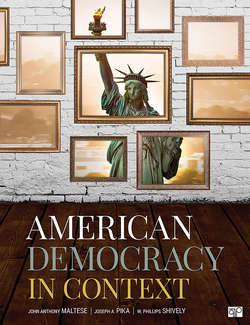Читать книгу American Democracy in Context - Joseph A. Pika - Страница 102
На сайте Литреса книга снята с продажи.
State Powers
ОглавлениеThose who opposed ratification of the Constitution did so because they felt it gave the new national government too much power—power that could be used to infringe upon both individual liberties (such as freedom of speech) and states’ rights. Ultimately, ratification came as the result of a promise to add a Bill of Rights through the process of amendment (see Chapter 2). Among the first ten amendments that collectively form the Constitution’s Bill of Rights, the Tenth Amendment serves as the major weapon in the arsenal of states’ rights.
The Tenth Amendment says that any power that the Constitution has not delegated to the federal government, nor prohibited the states from exercising, is “reserved to the States respectively, or to the people.” Among these reserved powers are states’ police powers: those used by states to manage and maintain public order through laws designed to protect (police) the health, safety, morals, and public welfare of their people. Police powers also permit state regulation of things such as crime, education, marriage, and traffic. Since these powers are left to individual states, the resulting laws may—and do—vary from state to state. However, the ambiguity of constitutional language can make it difficult to draw a clear line between delegated powers and reserved powers. In fact, the exact parameters of the police powers have fluctuated across time due to the U.S. Supreme Court’s changing interpretation of constitutional language.
For example, shifting interpretations of the commerce clause and the Tenth Amendment have allowed Congress to legislate in areas long thought to be the province of the states. Federal minimum wage laws were once routinely struck down by the Supreme Court as an unconstitutional infringement of state police powers under the Tenth Amendment. Now the Court upholds federal minimum wage laws as an acceptable exercise of Congress’s commerce clause power. Neither the language of the Tenth Amendment nor the commerce clause changed—only the Court’s interpretation of that language. We will examine specific examples of such changes later in this chapter.
In addition to their reserved powers, states have certain powers that are specifically listed in the Constitution (such as the power, enumerated in Article I, Section 4 to determine the “times, places, and manner” of holding elections for members of the U.S. House and Senate; and the power, enumerated in Article VII, to ratify amendments to the U.S. Constitution). A summary of the states’ reserved and enumerated powers can be found in Table 3.2.
Table 3.2
